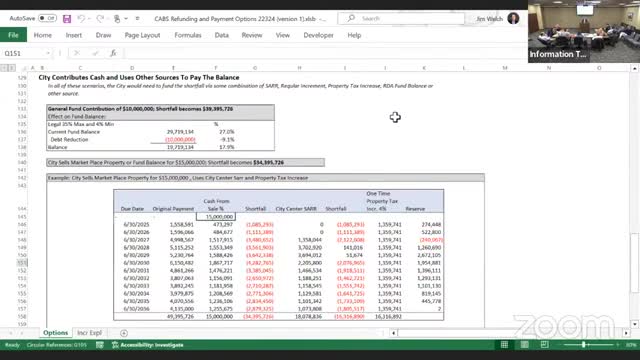Financial Crisis Looms Over Cultural Center Funding
February 23, 2024 | West Valley Planning and Zoning, West Valley City, Salt Lake County, Utah

This article was created by AI summarizing key points discussed. AI makes mistakes, so for full details and context, please refer to the video of the full meeting. Please report any errors so we can fix them. Report an error »

During a recent government meeting, officials discussed the financial challenges facing the redevelopment agency (RDA) due to changing revenue projections. The RDA's debt service, initially structured based on optimistic revenue estimates, is now at risk as actual funds from the RDA have fallen short of expectations.
The meeting highlighted the mechanics of tax increment financing, where property values in redevelopment areas are frozen at a base year, and any increases in property tax revenue—known as regular increment—are allocated to the RDA and other taxing entities. However, as redevelopment areas mature, the revenue generated tends to decline, complicating the agency's ability to meet its financial obligations.
A significant point of discussion was the additional increment revenue, referred to as SAR, which was intended to support projects like cultural centers. This funding mechanism, established by legislation in the early 1990s, allowed for additional revenue to be generated from property developments. However, the anticipated SAR funds have not materialized as expected, leading to concerns about the agency's capacity to service its debt, which totals approximately $49 million.
John Springmeier, the interim redevelopment agency director, explained that changes in state law in 2006 eliminated the SAR provisions for new project areas, further constraining the agency's financial resources. This legislative shift has left the agency grappling with the implications of reduced funding sources, particularly as it faces escalating debt payments in the coming years.
The meeting underscored the need for strategic discussions on how to address these financial challenges, as the agency seeks to navigate the complexities of funding redevelopment projects while ensuring fiscal responsibility.
The meeting highlighted the mechanics of tax increment financing, where property values in redevelopment areas are frozen at a base year, and any increases in property tax revenue—known as regular increment—are allocated to the RDA and other taxing entities. However, as redevelopment areas mature, the revenue generated tends to decline, complicating the agency's ability to meet its financial obligations.
A significant point of discussion was the additional increment revenue, referred to as SAR, which was intended to support projects like cultural centers. This funding mechanism, established by legislation in the early 1990s, allowed for additional revenue to be generated from property developments. However, the anticipated SAR funds have not materialized as expected, leading to concerns about the agency's capacity to service its debt, which totals approximately $49 million.
John Springmeier, the interim redevelopment agency director, explained that changes in state law in 2006 eliminated the SAR provisions for new project areas, further constraining the agency's financial resources. This legislative shift has left the agency grappling with the implications of reduced funding sources, particularly as it faces escalating debt payments in the coming years.
The meeting underscored the need for strategic discussions on how to address these financial challenges, as the agency seeks to navigate the complexities of funding redevelopment projects while ensuring fiscal responsibility.
View full meeting
This article is based on a recent meeting—watch the full video and explore the complete transcript for deeper insights into the discussion.
View full meeting

